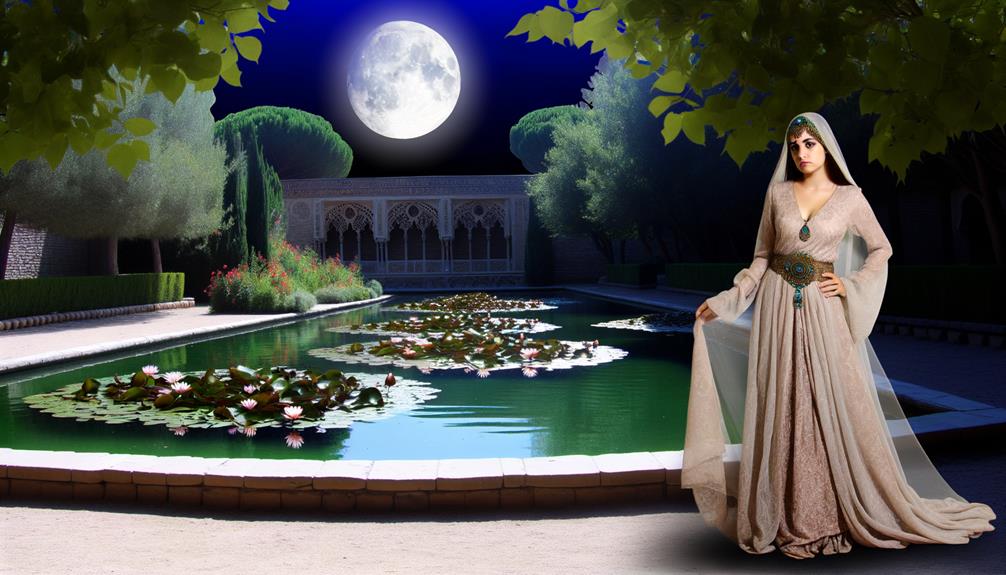Meaning of the Name Elaine
The name Elaine, derived from the Old French adaptation of the Greek name Helene, epitomizes a rich historical and cultural heritage. Prominent in Arthurian legends, Elaine symbolizes purity, love, and tragedy.
The character's portrayal in literature often intertwines with themes of sacrifice and emotional complexity, offering a nuanced understanding of her moral and emotional depth. Today, the name Elaine retains its timeless elegance and historical richness while being appreciated in contemporary contexts.
Notable individuals like Elaine May and Elaine Chao further highlight its enduring appeal. If you explore further, you'll uncover the multifaceted layers of Elaine's significance.

Key Takeaways
- Elaine originates from the Old French adaptation of the Greek name Helene.
- In Greek, Helene means "light" or "torch."
- Elaine symbolizes purity, love, and tragedy in Arthurian legends.
- The name is historically significant, appearing in medieval literature and mythology.
- Modern appreciation of Elaine includes its timeless elegance and historical richness.
Historical Origins
The name Elaine, rooted in historical and linguistic traditions, finds its origins in the Old French adaptation of the Greek name Ἑλένη (Helene).
This transformation from Greek to Old French reflects broader historical patterns of cultural exchange and linguistic evolution.
During the medieval period, the name Elaine gained prominence in Arthurian legends, notably through the character Elaine of Astolat, also known as the Lady of Shalott.
The transmission of the name through literature and oral traditions underscores its enduring appeal.
Additionally, its persistence in various forms across different cultures highlights the adaptation and resilience of linguistic elements over centuries.
The historical journey of the name Elaine offers a fascinating glimpse into the dynamics of language and cultural heritage.
Etymology
Etymologically, Elaine is derived from the Old French name Hélène, which itself originates from the ancient Greek name Ἑλένη (Helene), meaning 'torch' or 'corposant.' The linguistic journey of the name Elaine showcases the evolution of phonetic and semantic elements across cultures and time periods. The Greek term Ἑλένη (Helene) was integrated into Latin as Helena, eventually morphing into Hélène in Old French. This transformation reflects broader linguistic patterns of vowel shifts and consonantal adaptations typical in the evolution of names.
| Language | Form | Meaning |
|---|---|---|
| Ancient Greek | Ἑλένη (Helene) | Torch, Corposant |
| Latin | Helena | Torch, Light |
| Old French | Hélène | Bright, Shining |
Understanding these etymological roots enriches the appreciation of the name Elaine's historical and cultural significance.
Greek Mythological Connections
The name Elaine is intricately connected to Greek mythology, particularly through the figure of Helen of Troy. Linguistically, Elaine can be seen as a variant of Helen, who is famously known for her role in sparking the Trojan War.
Additionally, some mythological texts suggest a lesser-known narrative of Helen's sister, further amplifying the name's mythological resonance and cultural significance.
Helen of Troy Link
Intriguingly, the name Elaine can be traced back to Greek mythology, where it shares a common root with Helen, the legendary figure whose beauty sparked the Trojan War. Linguistic analysis reveals that both names derive from the Greek name 'Helene,' highlighting their interconnectedness.
This connection implies several layers of cultural and mythological significance:
- Etymology: Both names originate from the Greek word 'helene,' meaning 'torch' or 'corposant.'
- Mythological importance: Helen's beauty and its consequences have entrenched her name in historical lore.
- Cultural diffusion: The name Elaine spread through various cultures, adapting over time.
- Literary resonance: Elaine appears in Arthurian legends, showing the enduring influence of classical mythology.
This etymological link underscores the name's deep-rooted mythological heritage.
Helen's Sister Myth
Among the lesser-known aspects of Greek mythology, the mythological connections between Helen of Troy and her sister, Clytemnestra, offer a fascinating glimpse into the complexities of ancient narratives and familial relationships.
Helen, renowned for her beauty and pivotal role in the Trojan War, contrasts sharply with Clytemnestra, known for her tragic involvement in the murder of her husband, Agamemnon. These differing portrayals enrich our understanding of Greek myths, revealing a spectrum of female archetypes, from the adulterous femme fatale to the vengeful wife.
The nuanced interactions and divergent destinies of these sisters underscore the intricate storytelling techniques of ancient Greece, where familial bonds are both revered and fraught with tension, embodying the dualities of human nature.
Arthurian Legends
Elaine's name carries significant weight within Arthurian legends, often symbolizing purity, love, and tragedy through various narrative arcs. Her character appears in multiple forms, each embodying distinct aspects of these themes:
- Elaine of Astolat: Also known as the Lady of Shalott, she represents unrequited love and sacrifices herself for Sir Lancelot.
- Elaine of Corbenic: Mother of Galahad, she symbolizes purity and the divine quest, contributing to the Holy Grail narrative.
- Elaine the White: Known for her tragic end, she is often depicted as a figure of sorrow and unfulfilled desires.
- Elaine of Garlot: A lesser-known figure, she connects various familial ties within the Arthurian lineage.
These Elaines collectively enrich the mythos, embodying complex emotional and moral dimensions.
Literary References
The name Elaine has been a recurrent motif in literary works, often utilized to evoke themes of purity, love, and tragedy across various narratives and genres.
In Alfred Lord Tennyson's 'Idylls of the King,' Elaine of Astolat, also known as the 'Lady of Shalott,' symbolizes unrequited love and ultimate sacrifice. Her tragic end, floating down the river to Camelot, underscores the poignancy of unattainable desire.
Another notable example is T.H. White's 'The Once and Future King,' where Elaine is portrayed as a figure caught in the complexities of love and loyalty.
These literary depictions frequently align with the name's etymological roots, derived from the Greek 'Helene,' meaning 'torch' or 'light,' further enhancing its thematic resonance.
Name Popularity Over Time
Analyzing the historical popularity trends of the name Elaine reveals its varying levels of favor across different decades. From its peak in the mid-20th century to its more recent shifts in popularity, the name's trajectory offers insights into changing cultural and linguistic preferences.
This examination will provide a detailed understanding of how the name Elaine has both risen and waned in public favor over time.
Historical Popularity Trends
Throughout the decades, the name Elaine has experienced fluctuating levels of popularity, influenced by cultural, literary, and societal trends. In analyzing historical data, several key periods stand out:
- Mid-20th Century Peak: Elaine saw a significant rise in the 1940s and 1950s, peaking in the 1940s. This surge can be attributed to its classical allure and literary associations.
- Post-1960s Decline: The name began to decline in popularity after the 1960s, as naming trends shifted towards more modern and diverse choices.
- Cultural Influence: Various cultural works, including Tennyson's 'Idylls of the King', have intermittently revived interest in the name.
- Modern Nostalgia: Recent decades have seen a mild resurgence, driven by a nostalgic return to vintage names.
These trends illustrate Elaine's enduring, albeit variable, appeal.
Recent Popularity Shifts
In recent years, the name Elaine has witnessed subtle shifts in popularity, reflecting broader trends in naming conventions and cultural nostalgia. Historically rooted in Arthurian legend, Elaine evokes a classic, timeless quality.
Recent data indicates a modest resurgence, driven by a renewed appreciation for vintage names. This trend aligns with a broader societal inclination toward names that convey heritage and simplicity.
Linguistically, Elaine's phonetic appeal—characterized by its mellifluous 'E' sounds and balanced syllabic structure—enhances its attractiveness. While not dominating contemporary name charts, Elaine's steady presence signifies its enduring charm.
This nuanced popularity is also influenced by media portrayals and literary references, subtly reinforcing its cultural relevance and appeal in modern naming practices.
Cultural Significance
The name Elaine holds significant cultural resonance, often intertwined with mythological narratives and historical contexts that have shaped its perception over time. Linguistically derived from the Greek name Helen, Elaine has traversed various cultural landscapes, acquiring distinct connotations. Its cultural significance is evident in multiple domains:
Arthurian Legend: Elaine is a prominent figure, often depicted as the Lady of Shalott or the mother of Sir Lancelot.
Literature: Tennyson's poem “The Lady of Shalott” immortalizes the name in Victorian literature.
Christianity: Saints bearing the name Elaine have influenced its sanctified status.
Historical Usage: The name's popularity across different eras reflects societal shifts and enduring appeal.
Such associations render Elaine a name rich in cultural and historical depth.
Modern Interpretations
Modern interpretations of the name Elaine often reflect contemporary values and trends, highlighting a shift towards appreciating its timeless elegance and historical richness while also embracing new cultural contexts.
Linguistically, Elaine is derived from the Old French form of Helen, meaning 'light' or 'bright.' This etymology resonates with modern preferences for names that convey positive attributes.
Culturally, Elaine's association with Arthurian legend adds a layer of romantic mystique, appealing to those who value storied names with deep roots. Additionally, the name's adaptability across various languages and regions underscores its global appeal.
As society increasingly values individuality and cultural heritage, Elaine embodies a perfect blend of classic charm and modern relevance, making it a favored choice among contemporary parents.
Famous Namesakes
Numerous notable individuals named Elaine have made significant contributions across various fields, enhancing the name's prominence and cultural resonance. Their achievements span literature, politics, entertainment, and academia, illustrating the diverse impact of those bearing this name.
Key figures include:
- Elaine May: A renowned American comedian, screenwriter, and director, known for her sharp wit and influential work in film and theater.
- Elaine Chao: The first Asian-American woman to be appointed to a U.S. President's Cabinet, serving as Secretary of Transportation and Secretary of Labor.
- Elaine Stritch: An acclaimed actress and singer, celebrated for her work on Broadway and her distinctive voice.
- Elaine Pagels: A prominent religious historian and author, recognized for her research on early Christianity and Gnosticism.
These individuals exemplify the name's significant cultural footprint.
Conclusion
The name Elaine embodies a rich tapestry of historical origins, etymological roots, and cultural significance. From its connections to Greek mythology and Arthurian legends to its presence in literary works, the name has traversed centuries, reflecting evolving societal values. In addition, the name Elaine has also been interpreted differently across different cultures and languages, highlighting its versatility and adaptability. From its Latin origins to its usage in French and English contexts, the name has continuously evolved, reflecting the diversity and interconnectedness of global societies. The origin and etymology of Elodie, a similar-sounding name with potential connections to the Greek word “elódēs” meaning “clear” or “light,” further exemplify the intricate layers of meaning and history embedded in names.
Its fluctuating popularity over time underscores its enduring charm and adaptability. Modern interpretations and notable namesakes continue to imbue Elaine with contemporary relevance, ensuring its place as a name of lasting resonance and multifaceted meaning.






